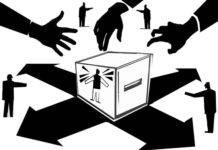The most encouraging outcome of this tragedy has been the national outpouring of support
A year on since the worst industrial disaster in Bangladesh’s history, the deadliest garments accident in history, and the deadliest accidental structural failure in modern times; the only questions that really need asking are, what have we learnt, and what are we doing about it?
The hyperbolic, and patently exaggerated fears of imminent ruin by garment-owners, their threats about the collapse of the national economy, and their insistence that they are “commercially important people” and therefore above reproach have been heard.
The violent demonstrations for better wages and conditions by workers and their support networks, the allegation of sabotage, and the police action against them have been seen. The Sohel Ranas and the Murad Jungs, the government’s impotence against them and its inability to reel in unethical operators in the industry as well as their own ranks have been exposed. After it’s all been taken into account we are left with a few simple yet inevitable conclusions.
Our economy is in desperate need of diversification. It can no longer be reliant on a competitive advantage that is based on a race to the bottom for cheaper labour. This has proven to put lives at risk, and will be untenable in the future as the cost of living drives up wages. It is not only unethical, but makes bad business sense and will leave Bangladesh hostage to an exploitative economic order that belongs in the Middle Ages. We need industries that produce goods that are higher up the value chain and workers that have the skills to produce them.
The government must be able to regulate the sector, and all sectors much better. While small government may be better for business, no government is surely catastrophic. Not enforcing building codes, safety standards, and fairness for workers will eventually lead to a “disabled” environment that will drive away investors. This is a concrete social obligation that is non-negotiable.
The industry must weed out rogue traders and insist on better standards from their members. Compliant factories and businessmen should no longer have to bear the brunt for the negligence of their non-compliant co-industrialists.
There must be measures within the industry and in the BGMEA to make sure they are not all painted with the same brush. This is their own responsibility and it will not do to cry foul when they are lumped together, unless they do anything to stand apart themselves.
Workers must not be forced to resort to violence and vandalism, but must be allowed to voice their concerns in a responsible manner. This means they must have representation.
How much of this has been done? Not a lot, but then again, not nothing either. Since April last year, the government has tried to regulate the sector better, more inspectors have been fielded, non-compliant factories have been shut down, and owners with blood on their hands have been arrested. However, the garments industry lobby has proven to be strong enough to retain the industry’s standing, and their threats of an economic collapse have kept stronger action at bay.
They (the industry) have in fact done themselves and the nation a disservice by banding together the way that they did, instead of throwing the criminals among them under the bus.
The buyer, for their part, has acted more commendably, and a number of accords and agreements have been inked, with ILO oversight, to ensure sourcing occurs in a more conscientious and meticulous manner. They have also agreed, some of them at least, to share more of the profits with producers.
In some instances, privileges have also been withdrawn until better compliance is achieved. These are positive developments, the benefits of which will hopefully reach the workers.
The workers have also experienced a pay rise, and compensation to victims of the Rana Plaza tragedy has been forthcoming, though many would say not enough and not soon enough. However, it’s equally evident that no one has been able to get away with doing nothing, and with sustained pressure, it’s likely that they will eventually have to do their best.
But the most encouraging outcome of this horrendous tragedy has been the national outpouring of support. There are no blind eyes being turned, and no one is willing to let this get swept under the rug. The debate has been sustained, actions demanded, and consequences felt, and though it’s been slow going, there is reason to believe that it will not stop until the minimum standards that become a country on the threshold of middle-income status, with all its attendant rights and responsibilities, are achieved.
Source: Dhaka tribune










